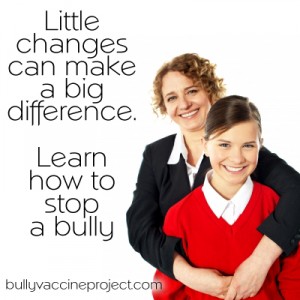Adults mean well. They really do. But ignore them and they will go away isn’t actually good advice to give to a kid.
First, You can’t ignore someone who is in your face.
Second, depending on the bully and how they are being rewarded, ignoring them will probably make the situation worse, not better.
Third, this advice is short hand for what does work – stop rewarding them and they will go away. The difference between ignore them and stop rewarding them matters.
Kids need good factual actionable information on how to get bullying to stop. The need detailed, here is what you say, this is how you stand, this is what is going to happen when you do it and here is what I want you to do when that happens, type of information.
If you are a parent, you should be explaining the science. To get an unwanted behavior to stop, you have to remove the reward the bully gets for doing it. The victim, your child, is probably not rewarding the bully. Bystanders probably are. Which means, you kid isn’t doing anything to bring this on themselves and ignoring the bully won’t remove the reward.
Ignoring a bully means being silent and moving on. This is usually seen as submission, which is a reward for the bully. Because mostly what the bully wants is attention and to be seen as someone who can control others. The goal is to not be controlled by the bully so the bully is seen as ineffective and week and to increase the costs associated with the behavior so that whatever attention they do receive, it is offset greatly by the negative consequences this behavior has. Ideally you want their peers to look down on this behavior as inappropriate.
Ignoring them does none of that. Instead, you can command them to stop and when they don’t and they probably won’t, report them. Without fear and without emotion. Just matter of fact. You need to stop. If they don’t, tell a teacher.
This should be done without emotion. You are giving them a chance to not get in trouble. If they don’t take that chance, what happens next is a “natural consequence” of bad behavior.
The hardest part of teaching a kid this is helping them to be emotionally neutral about it. This takes practice. A parent should learn what exactly is being said and in what situations, then give your child something to say back and practice it with them. You want them to sound bored and matter of fact in the face of bullying. Once you know they can say the words, and not engage in an argument, just – stop and if they don’t, report, then let your child know what the likely response to them doing this will be. Which is that the bully may escalate and try again or change tactics. If they do that – report them.
Then, ask your child if they want you to tell their teacher what is going on. Usually they will say no and try to handle it themselves. Once they start and start reporting, they will usually ask you to help with the teacher because the teacher will probably not respond to the information that a kid is being bullied ideally. That doesn’t mean the teacher doesn’t care, it’s more that they have teaching to do and dealing with behavior is not what they want to be doing. This is when you can call and inform them what is happening and ask them for help. Asking for help works. Demanding they do something does not. I have an entire free course on how to talk to your child’s school so that they will listen and help.
If your kid is being bullied, learn what works to get it to stop and teach it to them. Don’t allow them to continue to suffer. Once you learn it – share this information and pass it on. Thanks and good luck.
